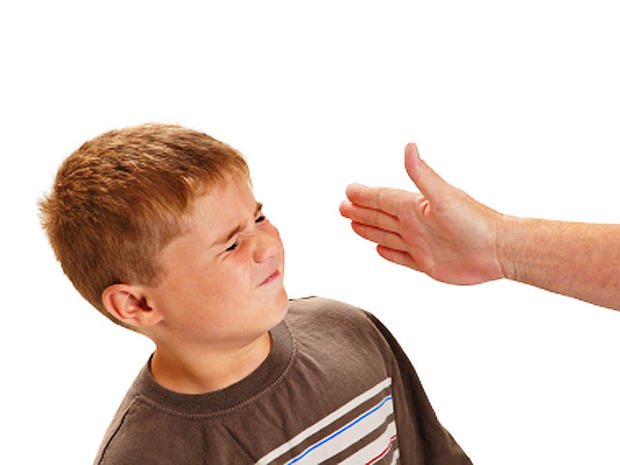Spanking, physical punishment may raise risk for mental health woes in adult years
(CBS News) Disciplining children with physical punishment such as spanking, shoving or slapping may raise their risk for developing mental health problems when they get older, new research suggests.
Sad dads spank more, study says: Who gets hit?
"We should not be using physical punishment on children of any age," Dr. Tracie O. Afifi, PhD, the new study's author and assistant professor of community health sciences at the University of Manitoba in Winnipeg, Canada, told WebMD.
For the study, published in the July 2 issue of Pediatrics, Canadian researchers looked at data from a U.S. survey of nearly 35,000 adults that was collected between 2004 and 2005. They determined about 6 percent of adults experienced harsh physical punishment in the absence of more severe forms of child maltreatment including physical, sexual or emotional abuse and neglect. Types of harsh physical punishment included spanking, slapping, hitting, shoving, grabbing and pushing.
The researchers found harsh physical punishment increased a person's odds for having a mood or anxiety disorder, engaging in alcohol or drug abuse and risk for several types of personality disorders. They determined that between 2 and 7 percent of mental health disorders among study participants were attributed to physical punishment.
"We're not talking about just a tap on the bum," Afifi told HealthDay. "We were looking at people who used physical punishment as a regular means to discipline their children."
According to the researchers, physical punishment by parents or caregivers has been abolished in 32 countries, not including the U.S. and Canada. A recent survey of the Carolinas found 46 percent of mothers reported slapping or spanking their child in the past year, while national estimates are similar (48 percent). The American Academy of Pediatrics strongly urges against physical punishment to discipline children.
The researchers want parents and pediatricians to know of the link between physical punishment and mental health disorders in the hopes that reducing physical punishment may reduce the prevalence of such disorders in the U.S. population.
Andrew Adesman, chief of developmental and behavioral pediatrics at the Steven & Alexandra Cohen Children's Medical Center of New York in Lake Success, N.Y, told WebMD that time-outs, when done properly, can be effective for preschool and school-aged children.
"A good rule of thumb is one minute for every year of age," Adesman said. "Time-outs should occur in a safe, central location where the child can be observed." He added that time-outs should be a time of quiet reflection, and not engaging or negotiating the child.
Not all psychologists, however, were ready to rule out disciplinary spanking.
"Certainly, overly severe physical punishment is going to have adverse effects on children," psychologist Dr. Robert Larzelere, of Oklahoma State University, Stillwater told USA Today. "But for younger kids, if spanking is used in the most appropriate way and the child perceives it as being motivated by concern for their behavior and welfare, then I don't think it has a detrimental effect."
WebMD has more tips for disciplining children.

